Okay, so she gave 48hrs notice each time. Lods birthday is coming up and she gives 3 day notice, that's 72 hrs. Yet DIL tells her no because it wasn't 48, what does it matter? So, she's not talking but they need help now. Maybe OP should tell them to give her 48 hrs. But then they woul end up calling her selfish, an AH, terrible grandma, etc, etc. Their is no pleasing the DIL.
I Refuse to Beg for Time With My Grandson
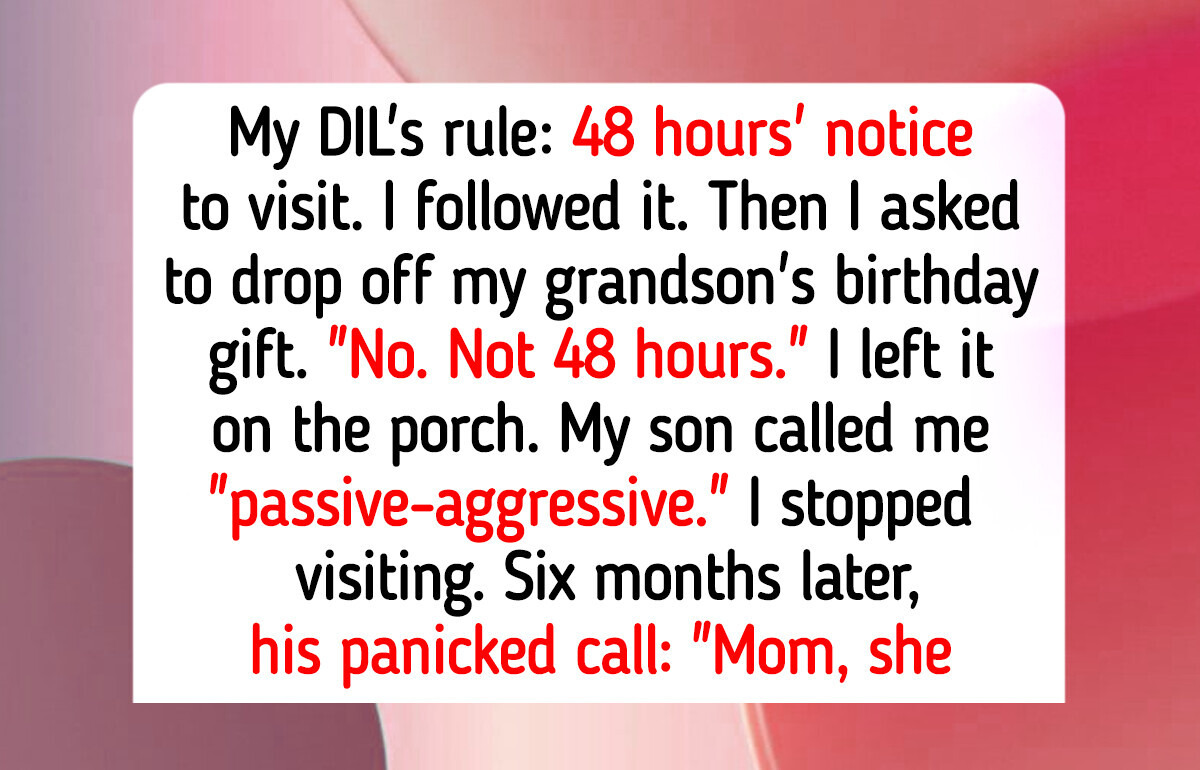
Being a grandparent should be a simple joy, not a constant negotiation just to spend time with your own grandchild. When you’re treated like a stranger who needs permission for every visit, constantly jumping through hoops, and still being told you’re doing it wrong, something’s broken. The rules aren’t really about scheduling—they’re about control. And sometimes the only way to win an unwinnable game is to stop playing it entirely.
Betty’s letter:
Hi Bright Side,
My daughter-in-law made a rule: 48 hours’ notice for any visits to see my grandson. I thought it was excessive, but I followed it religiously because I didn’t want conflict. I’d text her two days ahead, wait for approval, then visit at the exact time she allowed.
Last month was my grandson’s third birthday. I asked three days in advance if I could drop off his gift. She said no—I hadn’t given 48 hours’ notice before the party itself, just before my drop-off. I was confused but didn’t argue. I left the wrapped present on their porch with a card and drove away.
My son called that evening and said I was “being passive-aggressive” by leaving the gift instead of coming to the party. I explained that his wife had denied my request, and he said I should have “tried harder to work it out with her.” That’s when something in me just broke.
I stopped visiting. I stopped asking. Six months of silence passed. Then last week, my son called, panicked: “Mom, we need you. We have a work emergency. Can you take him for the weekend?” I was so caught off guard. Part of me wanted to help because I miss my grandson desperately. But part of me felt like I was only being called because I was suddenly useful.
I told him I needed time to think about it and hung up. Now he’s calling repeatedly, and DIL actually texted me—first time in months—saying they “really need family right now.” I don’t know what to do. Did I make things worse by stepping back? Should I help them after being shut out for half a year? How do I protect myself while still being in my grandson’s life?
Please help,
Betty
Thank you for writing, Betty. You didn’t create this situation by stepping back—you just stopped accepting treatment that was hurting you. Wanting to see your grandson without jumping through unreasonable hoops doesn’t make you wrong.
Recognize that you’re being called because you’re convenient, not valued. For six months, they managed without you just fine. Now there’s an emergency, and suddenly you’re “family” again. This tells you that your relationship with them is transactional—you’re welcomed when they need something and shut out when they don’t. Before you agree to help, ask yourself if this is really about rebuilding a relationship or just about them needing free childcare. Their pattern of behavior suggests it’s probably the latter.
Help your grandson, not them. If you decide to take him for the weekend, frame it clearly in your mind: you’re doing this for your relationship with your grandson, not to bail out adults who’ve shown you little respect. Your grandson didn’t create these rules, and he shouldn’t suffer because his parents and grandmother can’t get along. You can help him while still maintaining boundaries with his parents. Those are separate relationships.
Watch whether they’re grateful or entitled. Pay attention to how they act if you help them. Do they genuinely thank you and acknowledge what you’re doing? Or do they act like you owe them this, like you’re finally “acting like family” after being “difficult” for six months? Their attitude will tell you whether they see this as a chance to rebuild or just as getting what they wanted all along. Gratitude and entitlement look very different.
Consider what example you’re setting for your grandson. As he gets older, he’ll pick up on family dynamics. If you let his parents treat you poorly and keep coming back without boundaries, you’re teaching him that’s how relationships work—that some people get to make all the rules while others just accept whatever treatment they’re given. Showing him that you have self-respect and require basic courtesy might be a more valuable lesson than always being available, no matter how you’re treated.
This childfree employee made a decision that shocked her entire office. After four years of working every holiday while parents got automatic time off, she finally said no—and what happened next changed everything. This is the letter she sent us.
Comments
So, idm rhe 2 day notice thing, but i dislike the whole son complaining about you not coming to the party when hed have known the rule? But also like wouldnt that have been a exception to rhe 48 hr rule?
Related Reads
I Absolutely Refuse to Give Up My Apartment for My Sister and Her 3 Kids
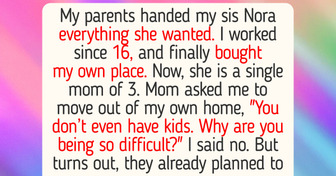
11 People Who Proved That Quiet Kindness Lights the Darkest Moments

15 Times People Refused to Be Mean—And Kindness Proved More Powerful
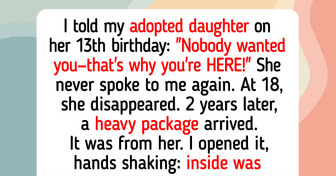
I Demand That My 16 Y.O. Daughter Pay for Rent and Groceries, Nothing in Life Is Free
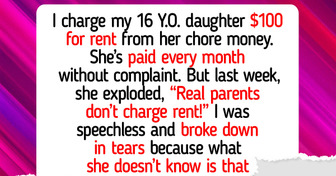
12 Moments That Remind Us to Stay Kind Even When Life Isn’t Gentle

10 Dating Stories That Started Like Rom-Coms but Ended Like Horror Movies

I Refused to Join a Work Call From My Honeymoon—I Froze the Entire Office
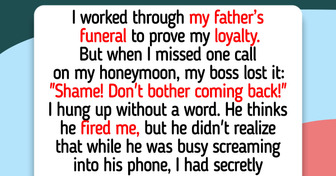
My MIL Tried to Humiliate Me at the Altar—By Morning, She Wasn’t Laughing

I Refuse to Cook Vegan Meals for My Stepson—And It Turned Into a Nightmare

My Parents Refused to Fund My Education, So I Turned the Tables on Them

14 Powerful Kindness Stories That Restored Hope in Tough Times

I Refuse to Return My Late Colleague’s Paycheck, Now His Widow Is Furious



